The Complicated Life and Death of Hideki Irabu

This story appears in the Aug. 7, 2017, edition of SPORTS ILLUSTRATED. Subscribe to the magazine here.
No one had noticed anybody come or go for days when, just after 4 p.m. on Wednesday, July 27, 2011, a man emerged from a tidy three-bedroom house near the end of a cul-de-sac in Rancho PalosVerdes, Calif. His screams pierced the suburban idyll of the affluent neighborhood, with its hilltop homes and panoramic views up toward Los Angeles and out over the Pacific. Deputies from the L.A. County sheriff’s department arrived quickly. In one of the bedrooms, they found the friend the man had come to check on.
He was wearing a white T-shirt and dark shorts. His body, which a coroner measured at 6' 5" and 236 pounds, hung suspended from a half-inch-thick white rope. Judging by the state of him, he had died several days before—perhaps on Sunday, the last time he was known to be alive. He left no note for his wife and two young daughters, and though his computer was set to Japanese, a deputy determined that no document had been recently created. No one suspected foul play. “The manner of death is suicide,” concluded the autopsy report, filed two mornings later. Fourteen Julys after he had debuted on the mound at Yankee Stadium in front of 52,000 fans, and nine years after he’d thrown the last pitch of a major league career that had tailspinned from promising to punch line, Hideki Irabu, 42 years old, had died desperately alone.
The tabloids that had feasted on his many missteps gobbled up the news. In Anchorage, a 76-year-old Navy and Air Force veteran named Steve Thompson received a phone call. Thompson wasn’t a sharer; he had spent much of his life guarding a secret he thought he would never reveal. He didn’t tell his wife, Nit, why his face was ashen when he put down the phone. He didn’t say anything. Instead he walked to his covered porch, sat down in a chair and, for the next several hours, cried by himself.
Those who were close to Irabu, and there weren’t many of them, were remorseful about his death. They wondered what more they might have done to keep him from the end of that rope. No one, though, felt guiltier than Steve Thompson.
They called him Schwarzenegger for his imposing physique and “the Japanese Nolan Ryan” for his record-setting 99-mph fastballs. But the nickname that would stick to Hideki Irabu was uttered by George Steinbrenner in a fit of pique at the end of spring training in 1999: the Fat Pus-sy Toad. “Rhymes with fussy,” the New York Post always helpfully noted of the sobriquet that would define Irabu’s reputation.
His 1997 arrival in New York City—after a monthslong dispute over his right to leave the Chiba Lotte Marines and join his chosen MLB team—had been so auspicious. On July 9, after he signed a four-year, $12.8 million contract, Mayor Rudy Giuliani caught a pitch from Irabu on the steps of City Hall and presented him with a Tiffany crystal apple. The next day the righthander struck out nine Tigers over 6 2⁄3 innings.
Tasked with charting Irabu’s pitches from the dugout, rotation mate David Cone was enthralled. “There were so many different velocities—87, 89, 84, 95, 97,” Cone recalls. “He was a big guy, strong, and you’d heard about the power—but it wasn’t all power. He seemed to have finesse as well.” Giuliani never missed a chance to attach himself to the Yankees’ successes, which he did the following Sunday in his weekly radio address. “Hideki, like the millions of others over the last century, wanted to live the American dream in the greatest American city,” he said.
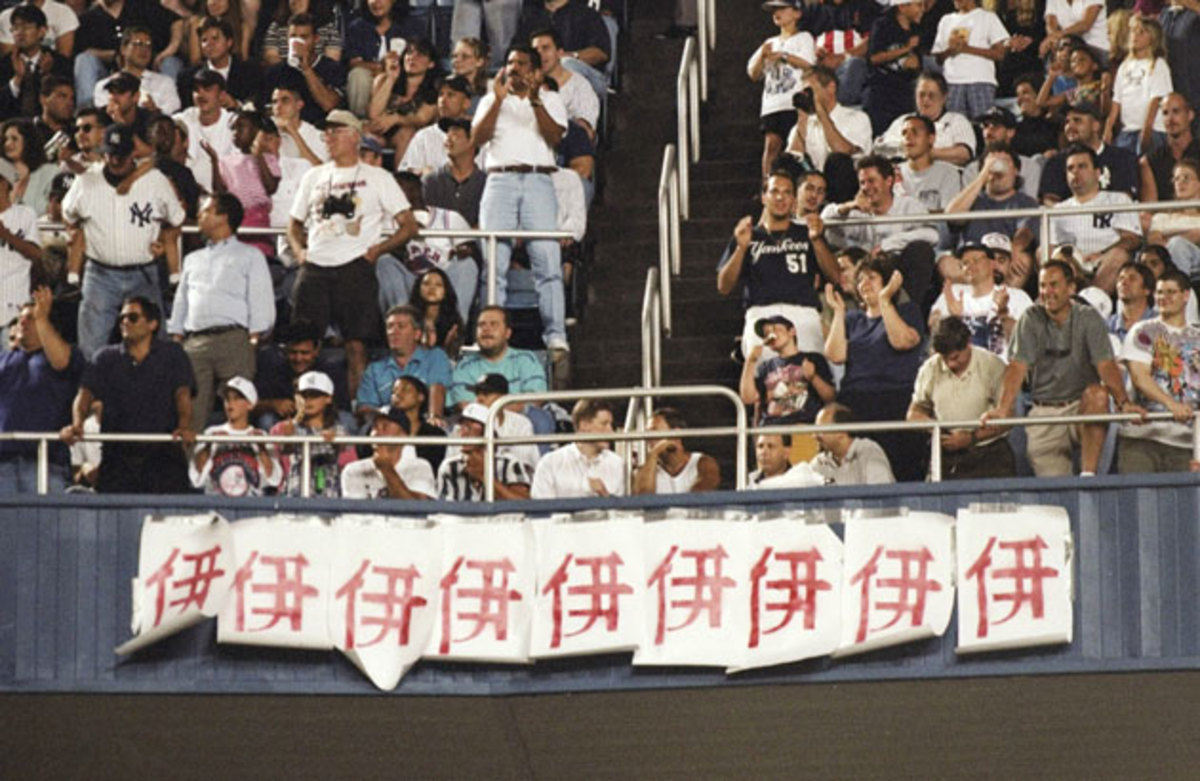
It wasn’t long before the dream began to sour. Irabu allowed five earned runs in his next outing, then six, then five. After a stint in the minors, he returned to finish his first season with an ERA of 7.09, having yielded an astonishing 2.5 homers per nine innings.
By 1998 many had written him off as a surly, out-of-shape bust. “How could you give 12 million dollars to Hideki Irabu?” screamed Frank Costanza at the Steinbrenner character in the series finale of Seinfeld, which aired in May of that year. Derogatory details about Irabu’s personal habits leaked into the papers. He smoked cigarettes after every half inning of every start. He went on drinking binges. He ordered at a sushi bar by waving his arm over the fish on display, to indicate: all of it. And he did himself no favors with the press. He was short with American reporters and disdainful of the Japanese corps, which he called kingyo no fun (goldfish s---) for the way it trailed him in a long line. In March ’98, during spring training, he demanded a Tokyo Broadcasting System cameraman’s videotape, that had captured what Irabu intended to be an off-the-record conversation, and stomped on it. He was already widely viewed as wagamama (selfish) because of the way he had forced his way out of Japanese baseball, and the reports sent back home did little to enhance his standing.
If Steinbrenner’s lasting insult, issued after Irabu had failed to cover first base in an exhibition game, augured the end of his Yankees tenure, Irabu didn’t formally leave until eight months later, following the only postseason appearance he would ever make. When Roger Clemens turned in an uncharacteristically poor outing against the Red Sox in Game 3 of the 1999 ALCS, manager Joe Torre turned to the last man on his staff to mop up. By the bottom of the sixth the score had ballooned to 9–0, and Irabu stormed into the Fenway Park clubhouse, firing his spikes into his locker and flinging his belt across the room. Then, half-undressed, something occurred to him.
“George,” he said to his translator, George Rose, “did the manager take me out of the game?”
Irabu ran back through the tunnel to the dugout, pulling on his uniform pants as he went, to find New York’s infielders warming up—and no one on the mound. He gave up four more runs that inning. In the end he completed 4 2⁄3 innings, yielding eight runs on 13 hits. It was the last time his name would ever appear in a Yankees’ box score and, to many, a fittingly buffoonish conclusion.
To his teammates, it wasn’t fitting at all. “He was an asset on our staff,” says Cone. “The day he pitched, we thought, Wow, if he’s on, he’s going to win the game for us. He could dominate an opposing lineup. That’s the way we saw him.” In fact, he had several tantalizing runs of brilliance in New York. He was named the AL pitcher of the month in May 1998, when he went 4–1 with a 1.44 ERA, and again in July ’99, when he went 4–0 with a 2.64. Despite his inconsistency, the sum of his performance over those two seasons was nothing disastrous: 342 innings in which he pitched to a 4.44 ERA during the height of the steroid era, with an ERA+ of 103, which pegs him as just above average.
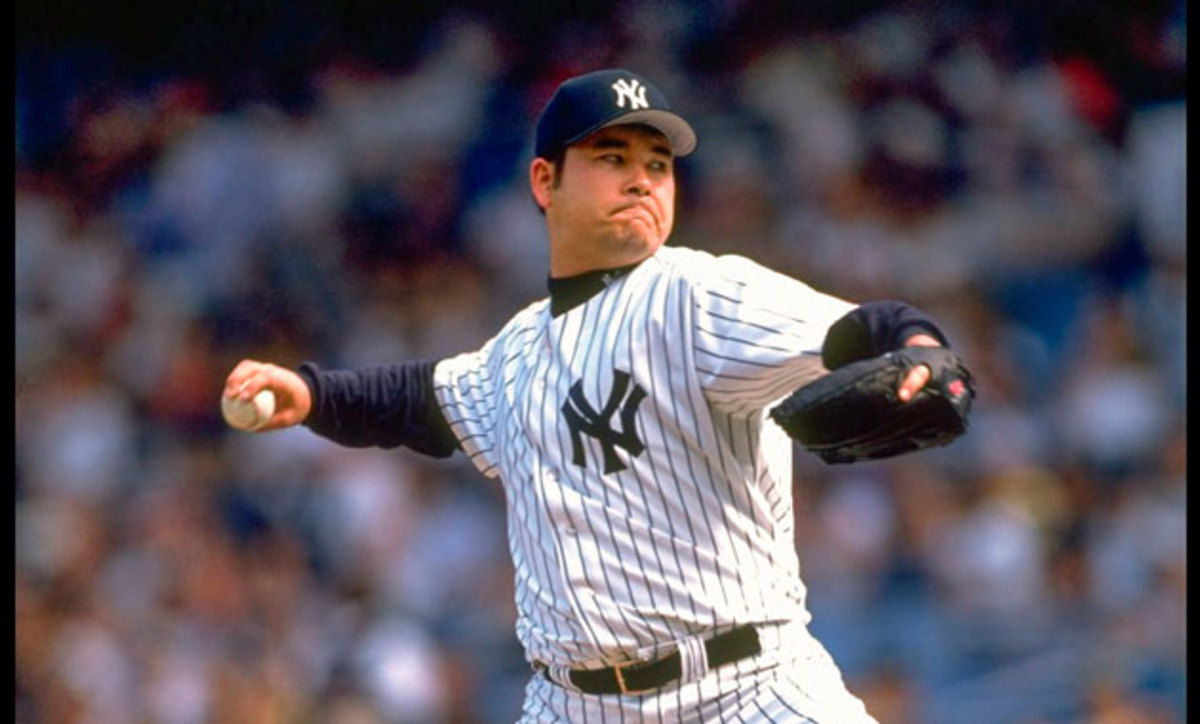
Steinbrenner, though, didn’t pay him $12 million for just above average, nor did Giuliani hand him a crystal apple for just above average, nor did Yankees fans applaud him for just above average. As it turned out, there were many things about the failed ace that none of them grasped.
By 1968, the Chicago-born, Oregon-raised Steve Thompson had spent nearly half his 33 years in the armed forces, and he was then an Air Force meteorologist stationed on Okinawa. He met a young waitress at a restaurant frequented by GIs on the island, and though they could not speak each other’s language—and though Thompson had a wife back at home—they began dating. Her name was Kazue. The next year, after Thompson had been deployed to Vietnam, he received a letter informing him that Kazue had given birth to their son in May.
Thompson returned to Okinawa in 1970, and marveled at the infant’s size and heft. He thought Hideki took after his own father, an imposing athlete who had tried out for the Red Sox several times. He went back to Vietnam, promising to return to Kazue and the only child he would ever have. He never did.
Japan can be a difficult place to be different, especially in the 1970s Osaka, where Kazue settled after marrying a restaurateur. While his mother never told him his father’s name, Irabu grew up knowing that he had been a white American serviceman. That was no secret in his home country. He was larger than the other kids. His hair was browner and his eyes were rounder. He was a target for bullies.
Baseball gave him an identity. As an adult he would often tell friends that if not for his extraordinary talent, he would have ended up in the yakuza—the mafia—which always found a way to use large, lost young men. Baseball saved my life, he’d say.
Yankees, Dodgers Win Big on Deadline Day, Making Dream World Series Matchup a Real Possibility
By 1997, when he was 28, Irabu was the most intimidating pitcher in the Japanese league. Then he found a greater purpose: the pursuit of freedom, specifically from the draconian reserve clause under which Japanese teams controlled their players’ rights for 10 years, allowing Chiba Lotte to sell his contract to the Padres without giving him any say in the matter. As agent Don Nomura and a lawyer in his office named Jean Afterman fought for him—with the help of the MLB players’ union—they realized that Irabu wasn’t just campaigning for himself. Nor did he view his victory, which came in April when the Yankees sent two prospects and $3 million to the Padres for his negotiating rights, as his alone. “He felt very, very aware that if he didn’t make a stand, then other Japanese ballplayers would be forced to go through what he went through,” says Afterman, who for the past 16 years has served as the assistant GM to the Yankees’ Brian Cashman. “I think he found his cause.”
Irabu opened himself up to Nomura and Afterman in a way he did with few others. He’d sit in Afterman’s office in Los Angeles every day that spring, chain-smoking and chatting and waiting for news. “He was fascinated by life,” she says. “He was a kid philosophy major. He had a lot of questions about life. He had a lot of curiosity. He had a lot of, as we would say in this country, things to work out.”
George Rose learned that about him too. Not long after graduating from Holy Cross, Rose, an English major, had sought adventure by taking a job teaching in an exchange program in the coastal Japanese town of Fukushima. Nine years later, just before he was to begin his final semester at Columbia Business School in the spring of 1998, he applied to be Irabu’s translator. He got the gig and put business school on hold.
Rose found himself thrust into an intimate sort of relationship with Irabu, whom he found to be much deeper than his reputation had suggested. “He never seemed comfortable—like he was always looking for who he was meant to be,” says Rose.
That restlessness revealed itself in many ways, including some that thwarted any chance of consistency on the mound. He would constantly change things up: adopting and discarding exercise routines, pasting tiny magnets to his scalp to regulate his body’s blood flow and, perhaps most damagingly, continually tweaking his mechanics. “He was always questioning himself,” says Nomura. “Even when he had a great outing, he’d suspect that the next time they were going to start reading his pitches, so he had to change something.”
Irabu’s battles with the Japanese media made sense to Nomura, even as he kept having to fly in, at Cashman’s request, to put out fires. For someone without a strong sense of who he was, it was a daily agony to have to answer questions about himself—particularly as Irabu’s interrogators represented a home country where he was never fully accepted.
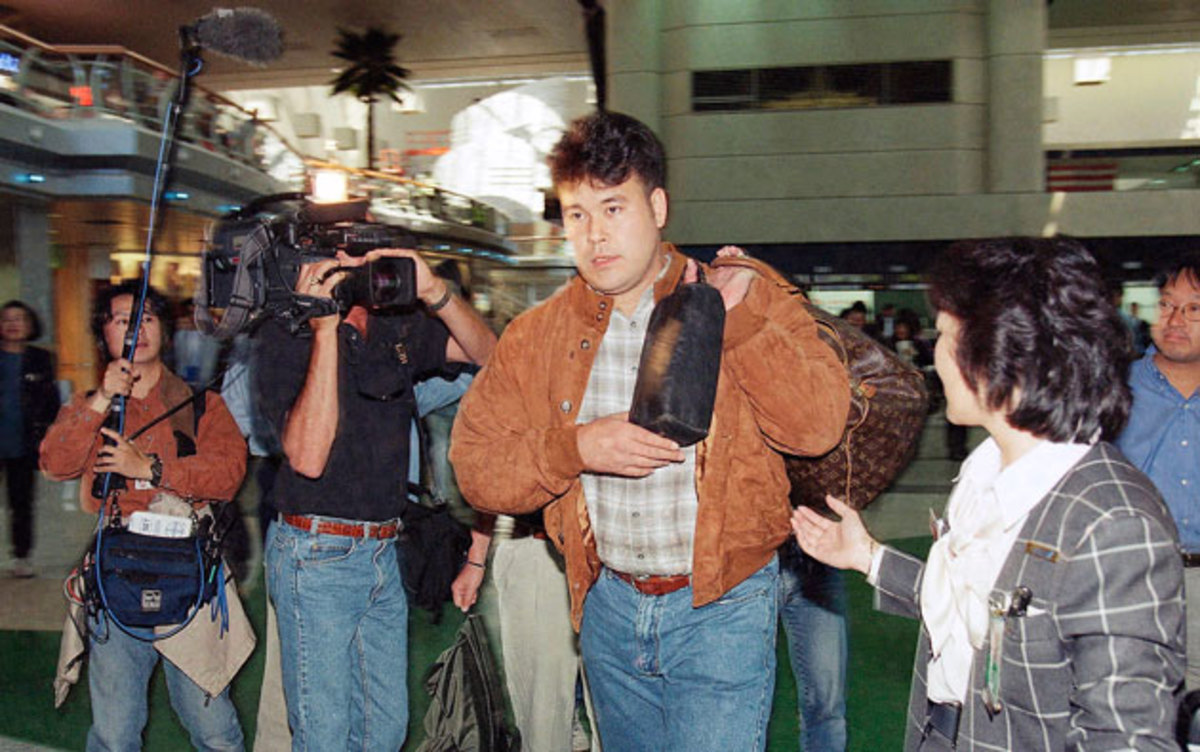
Irabu eventually sensed that he would never feel accepted in the U.S., either. Even with Rose’s steady help, the language remained an insurmountable barrier, as it always would. Despite the efforts of teammates like Cone and David Wells, a real connection with them remained out of his grasp. The two fellow starters would often ask Irabu and Rose out to dinner on the road, which is generally where baseball teammates bond. Once, after a few drinks in the John Hancock Center in Chicago, Cone and Wells began to needle Irabu in what they thought was a good-natured way—the same way they needled each other—about his toughness, about how he needed to scuffle through when things weren’t going well on the mound. Irabu stood up in the middle of the restaurant and ripped off his shirt, its buttons flying across the floor. “It was explosive,” recalls Cone. “It was like he snapped.” There was no more needling after that.
Irabu increasingly looked to a higher power. “He was a real spiritual seeker,” says Rose. “He had a relentless inquisitiveness. We’d talk for hours about what I believed—about Catholicism and Christianity—and what he believed.” He had once injured his back in high school, and he found a Buddhist monk on the Japanese island of Shikoku to pray for it to heal. It did, and thereafter Irabu viewed the man as his spiritual adviser. Under the monk’s direction, Irabu came to believe that he had a personal dragon who watched over him, and who appeared in his dreams. While tattoos were rare in Japan, he had a large image of his dragon inked onto his back. When he slumped, he would call the man for guidance as many as 35 times a day.
Of course, those who were close to him could sense what Irabu was really seeking. He referred to Rose, just three year his senior, as senpai—elder—and after the 1998 season Irabu gave him $50,000 from his World Series bonus to pay off his business school loans. He’d have terrible fights with Nomura, when the agent would reprimand him for his latest contretemps, but he always apologized. Nomura was also the Japan-raised son of a white American father, and Irabu knew that no one could better understand him; at dinners with Nomura, Irabu would order only water and a small salad, so as not to disappoint him with his appetites. Even Steinbrenner filled a fatherly role at times. For the Boss’s birthday in July 1999, Irabu sent him a gift intended to signal his forgiveness for Steinbrenner’s famous insult. It was a large mechanical toad that, with the press of a button, unleashed a loud ribbit. Steinbrenner kept it in his office for the rest of his life.
Still, Irabu’s biological father was out there somewhere. In his later years Irabu told at least one friend that one of the reasons he insisted on playing for the Yankees—not San Diego—was that if he became a star for America’s greatest team, then his father would have to come find him. The week after his Yankees debut, The New York Times revealed to American readers that Irabu’s father was a white GI—and a few dozen pretenders presented themselves over his first two seasons in New York. One even sent Nomura blood and hair samples. Finally, during spring training in 1999, Steve Thompson passed a note to Rose. Hideki called Kazue. Yes, she said. That’s your father.
Thompson had divorced his first wife in 1993 and later that year married Nit, a Thai immigrant who worked with him at Nellis Air Force Base in Las Vegas. “He loved kids, and he loved to take pictures of his friends’ kids playing sports,” Nit says. The photos were so good that sometimes his friends would offer to pay for them, but he’d give them prints for free. He buried his secret about his own son ever deeper within himself, never revealing it to anyone, not even Nit.
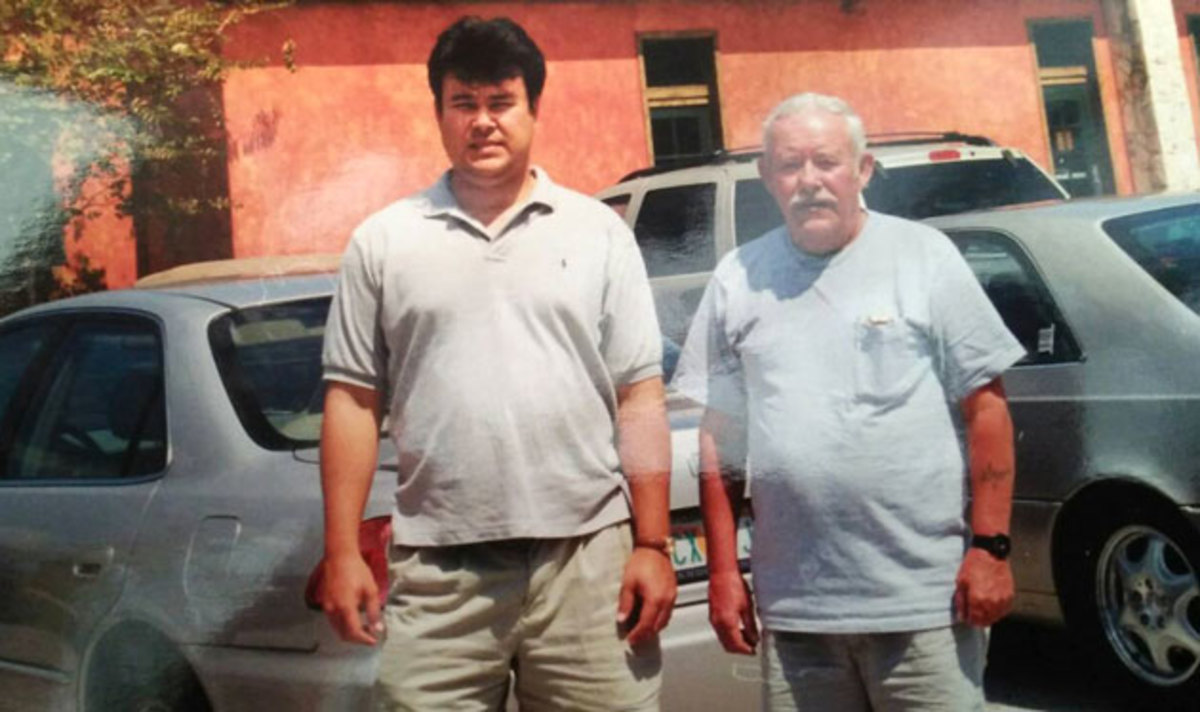
After the details of Irabu’s origins became widely known, Nit could tell that her husband was keeping something from her. “I’d ask him all the time—what’s wrong with you?” she says. “He’d sit and be quiet a lot. Sometimes he’d stare at the wall.” Finally, after more than a year, he broke down and revealed what had consumed him with guilt for three decades. Nit was shocked, but she encouraged him to go to spring training to meet his son. “I just don’t want him thinking I want something from him,” Thompson said.
Thompson, by then retired from the civil service, flew from the couple’s home in Anchorage, where they had relocated in 1994, to Tampa, to pass his note to Rose. To his surprise, Irabu agreed to see him—but to Irabu’s surprise, Rose recalls, Thompson looked little like the man he had long imagined. Irabu had assumed that his size had come from his father, but Thompson was just 5' 11" and 200 pounds.
During a few meals over the course of a few days, with Rose translating, they found similarities. Thompson, like Irabu, could be stubborn and hardheaded when he was young. They had the same slightly hunched, shoulder-forward posture. They both chain-smoked. Thompson spoke of his own baseball-playing father, who shared a birthday with Irabu, May 5. He also explained that after he returned to the U.S. from Vietnam, he had suffered from severe PTSD, which manifested itself in alcoholism. By the time he recovered and tried to contact Kazue, his letters never reached her; she and her son had moved.
Irabu seemed to accept Thompson’s explanation. It was, in all, a peaceful visit. But there wouldn’t be many more. While Thompson saw Irabu’s wife, Kyonsu, and then his two granddaughters over the years to come, he rarely saw Irabu again. They couldn’t speak the same language, and too much time had elapsed, too much life had happened. Irabu realized that just as Thompson didn’t want anything from him, he didn’t want anything from Thompson.
Irabu’s baseball life had a long, if quiet, tail: two uninspiring years with the Expos in 2000 and ’01, one more as a reliever with the Rangers in ’02, a stirring comeback with the NPB’s Hanshin Tigers in ’03 and then, in ’09, stints with independent-league teams in both California and Japan. He couldn’t give it up, until it gave him up. Then the man who once had many interests could focus on only one. “The only thing he ever talked about was baseball—not women, not love, not money,” says a friend from his later years.
MLB Trade Deadline Winners (Yankees, Dodgers) and Losers (Red Sox, Mets)
He dabbled in business, opening and closing a couple of noodle shops in Southern California. A year before he died, Cone and Wells reconnected with him at a baseball card show in New Jersey that brought together members of the Yankees’ 1998 championship team. “He talked to us about some business ventures he was trying to get going,” says Cone. “He had access to samurai warrior swords and armor, and he was trying to import them from Japan to sell them. He had things he was talking about doing, but it never really came together.”
Meanwhile, his family life was being washed away in a deluge of alcohol, as was any future in baseball. Without the sport’s structure, his periodic binge drinking became consistent. In 2008 he was arrested for assaulting a bartender during a visit to Osaka, and he was booked for a DUI in California in May 2010. After those incidents, no club on either side of the Pacific would hire him, even as an unpaid coach. By July 2011, Kyonsu, whom he had wed in ’97, had left their house in Rancho Palos Verdes and taken their daughters with her.
"I don’t know what to do with my day anymore,” he had told Rose, who finished business school and later returned to the Yankees to coordinate their Pacific Rim operations, in 2010. “Get up, watch TV, smoke cigarettes, have coffee.” Even his pioneering labor fight, which led directly to the modern posting system that gives Japanese players at least some say in their destination, seemed to have been largely forgotten.
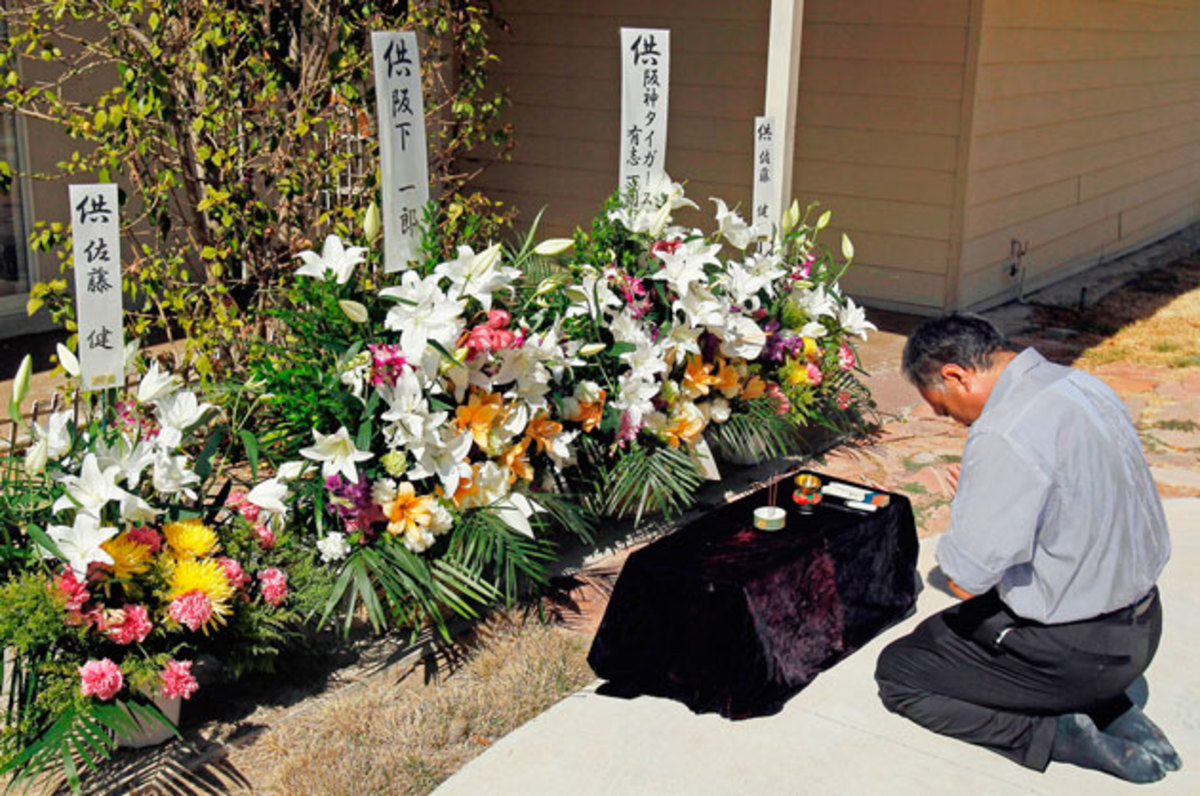
In the last year of his life, Irabu’s few remaining friends suspected that he was heavily medicated. The light had gone out of his eyes, they say. A rec-league teammate told police that Irabu had been despondent at a practice four days before his death—“I don’t want to live anymore,” he’d said—and he hadn’t been seen since the day after that. But no one thought to check on him until it was far too late.
The L.A. Sheriff Department’s search of his residence turned up one half-empty bottle of Paroxetine, the antidepressant known as Paxil, and two of the powerful benzodiazepine Lorazepam, an anxiety drug usually sold as Ativan. Ativan, in rare cases, has been associated with an increased suicide risk, especially for those with depressive tendencies, and the drug should not be taken with alcohol. Irabu’s toxicology report indicated that his postmortem blood alcohol content was 0.23%, nearly three times the legal driving limit in California, and also that Lorazepam was detected in his liver.
Still, it is careless to conclude that combination is why Irabu died, just as it is to sum up a man’s character in three words from an enraged sports team owner. Tragedies are never so simple. “He felt uncomfortable being in Japan, and he felt uncomfortable being in the United States,” says Nomura. “There wasn’t a home for him. It’s almost like he was always at the visitors’ ballpark.”
After Irabu’s death it was that way for Thompson, too. “He was quieter,” says his wife, Nit. “He kept talking about how he wanted to die. I’d say, If you die, who can I fight with?” In 2012 he was diagnosed with lung cancer, likely the result of a lifetime of two to three packs a day. He died in July 2016, at 81. He’s buried at Fort Richardson, in Anchorage, some 3,500 miles from Irabu’s ashes, which are kept in a small temple outside Tokyo.
Nit still has a photo album Steve made 18 years ago. It’s filled with pictures he took of his son, playing baseball.
